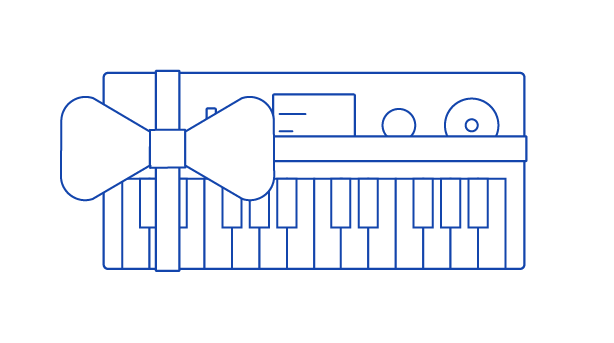Affordable MIDI keyboards for beginner home studios in 2022
Affordable MIDI keyboard controllers are an intuitive solution if you want to be more interactive with music composition on computers. With one small MIDI keyboard controller, you can make big moves within your DAW.
Manufacturers are always making new or improving existing affordable MIDI keyboards. After all, it’s these that many beginners use as entry-level MIDI controllers and forever expand the music-making community. With that in mind, we thought it was time to present you with a list of beginner MIDI keyboards that’ll empower you to make your music production and writing journey all the more interactive in 2022.
5. Native Instruments Komplete Kontrol M32
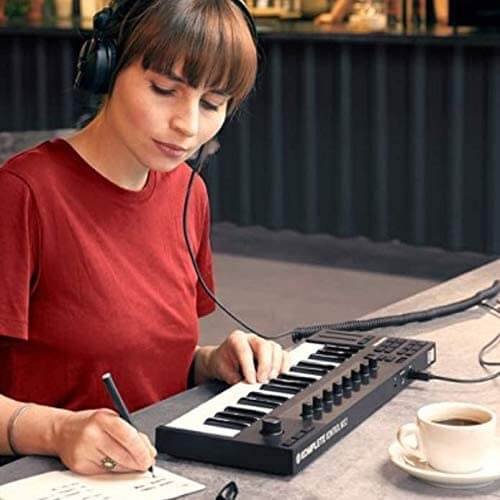
- $139
- 32-key mini-keys
- 8 touch-sensitive control knobs
- Modulation and pitch bend touch strips
- OLED display
The first affordable MIDI keyboard on our list is the Komplete Kontrol M32. It’s a fully portable MIDI keyboard that relies on USB 2.0 bus power. Weighing only 1.45kg, it houses 32 solid mini-keys and a lot of functionality.
Due to its size, the M32 is perfect for on-the-go musicians and producers. Though the keys aren’t the biggest and don’t support aftertouch, the controller does present you with the perfect layout for testing sounds, melodies, and more. Additionally, the OLED display is pretty informative. Like with the MPK, it provides responsive information based parameters you play with.
Another feature that finds its origins in NI’s A-series of controllers is the Smart Play feature. As a result of Smart Play, scale snapping, chord triggering and arpeggiation are all options that you can make use of easily.
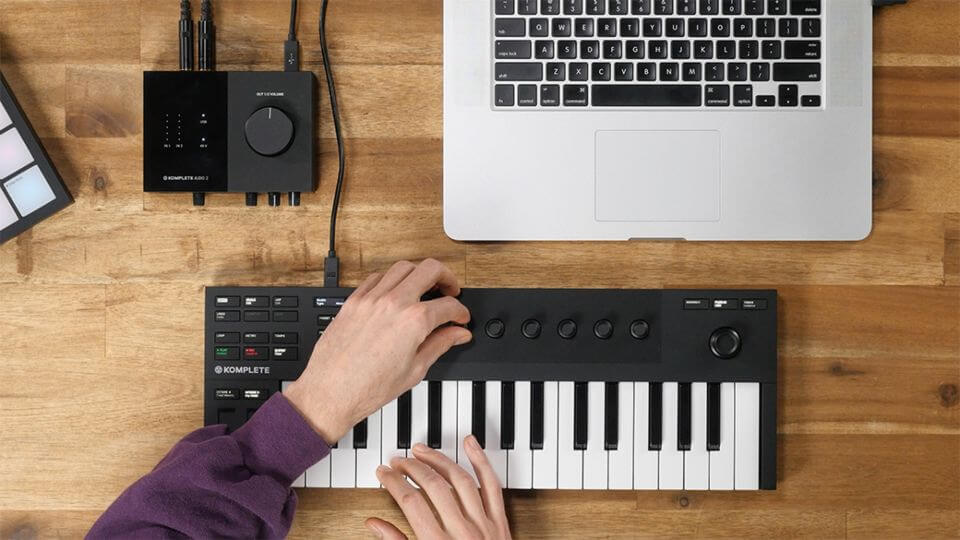
Rather than including pitch and mod wheels, the M32 makes use of a pair of short touch strips that fulfil those functions instead. Nevertheless, its eight capacitive knobs, 4D encoder and variety of buttons give you the ultimate MIDI experience. For example, its variety of controls allows you to manipulate plugin parameters in the included Komplete Kontrol software. Furthermore, you can operate the Maschine software easily and manipulate parameters in your DAW’s mixer too.
4. AKAI MPK Mini MK3
- $119
- 25 velocity-sensitive keys
- 8 MPC performance pads
- 8 encoder knobs
- OLED display
- Four-way joystick for pitch and modulation control
- Onboard arpeggiator
- 1500+ sounds
- Bundled with MPC Beat & 6 virtual instruments (Bassline, Tubesynth, Electric, Hybrid 3, Mini Grand, Velvet)
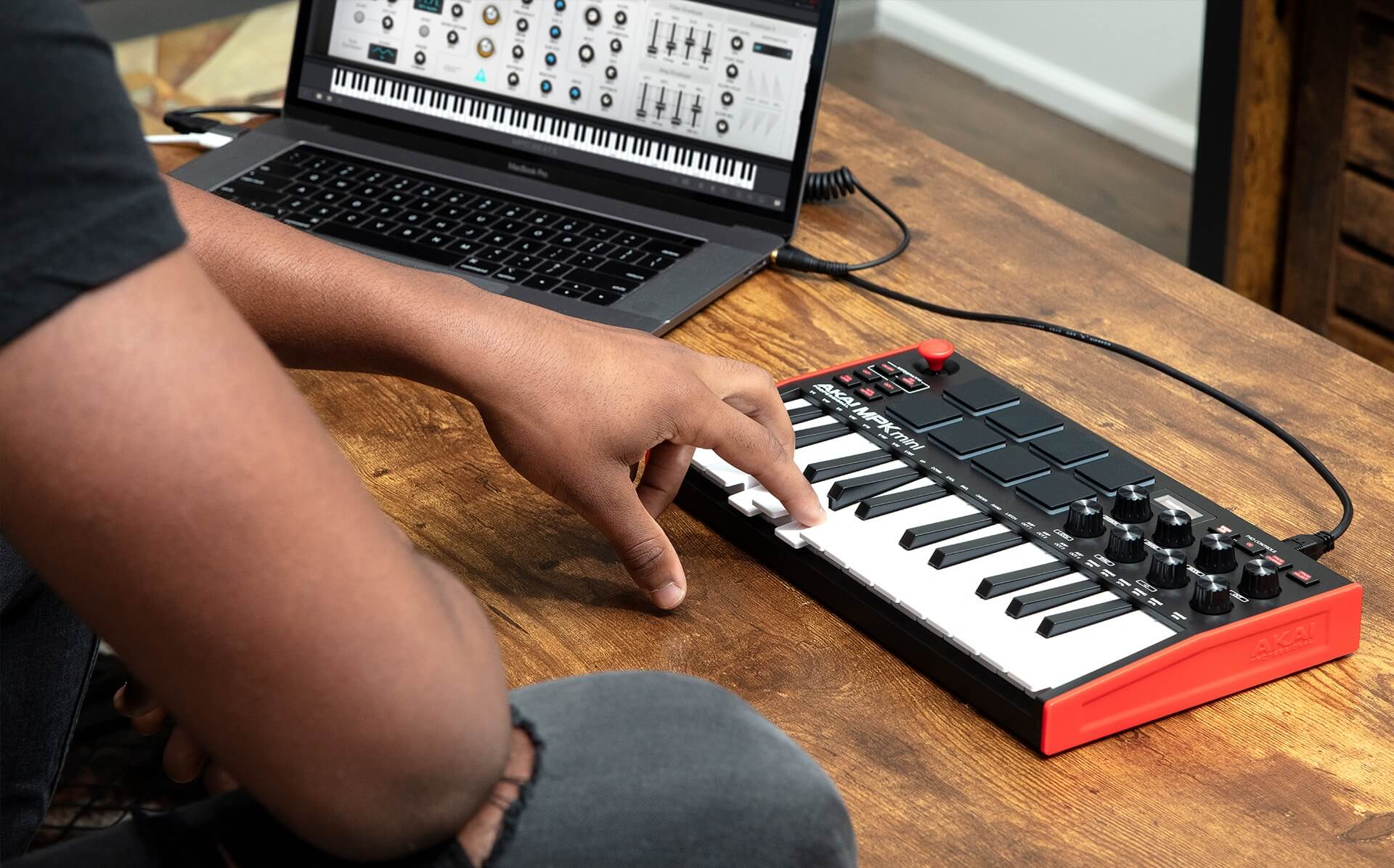
Though it does retain the 25 mini keys, eight velocity-sensitive pads, the eight knobs, and the notorious thumbstick pitch bend/modulation control, the AKAI MPK MK3 does have some big differences from MK2.
For example, the key bed is Akai’s new Dynamic Gen 2 design. They’re more responsive yet quieter than previous iterations. As for the knobs, these are now a continuous rotary design compared with both absolute and relative options to the encoder knobs of the MK2. The velocity-sensitive pads are more sensitive than the MK2 model too. They’re actually the same design found in the MPC series hardware! Of course, the most obvious difference is the little OLED screen. You’ll find this screen provides you with useful feedback on controller data and MIDI channels, just to name two. No noticeable latency presents itself either, and great pressure performance when playing sustained sounds. They also have channel and polyphonic aftertouch for creating melodies and chords that emulate that of a real instrument.
The overall design of the MPK Mini MK3 has changed slightly too. The USB over MIDI port is found on the back of the unit, and the layout of the buttons has also changed too. But controlling MIDI CC messages and Program Changes from the pads is as it was in the MK2.
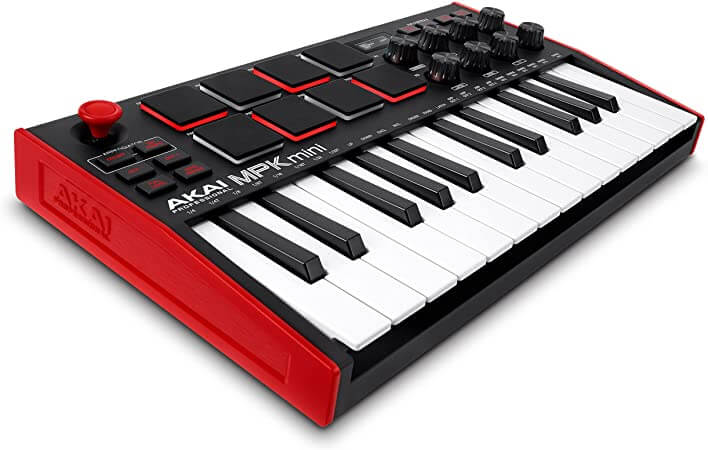
The MK3 also retains the joystick-style pitch bend/modulation control, and an A/B pad bank selector to switch between pad banks. There are still eight onboard preassigned presets, pad options for full velocity and note repeat, and a very fun onboard arpeggiator.
Finally, within the MPK Mini 3 Program Editor, you can tweak more settings such as MIDI channel edits and specific CC assignments too.
3. ARTURIA MiniLab MKII
- $99.99
- 25 velocity-sensitive keys
- 8 velocity-sensitive pads
- 16 encoder knobs
- Pitch and modulation touch strips
- Sustain pedal input
- Bundled with Ableton Live Lite, Analog Lab Lite and UVI Grand Piano Model D
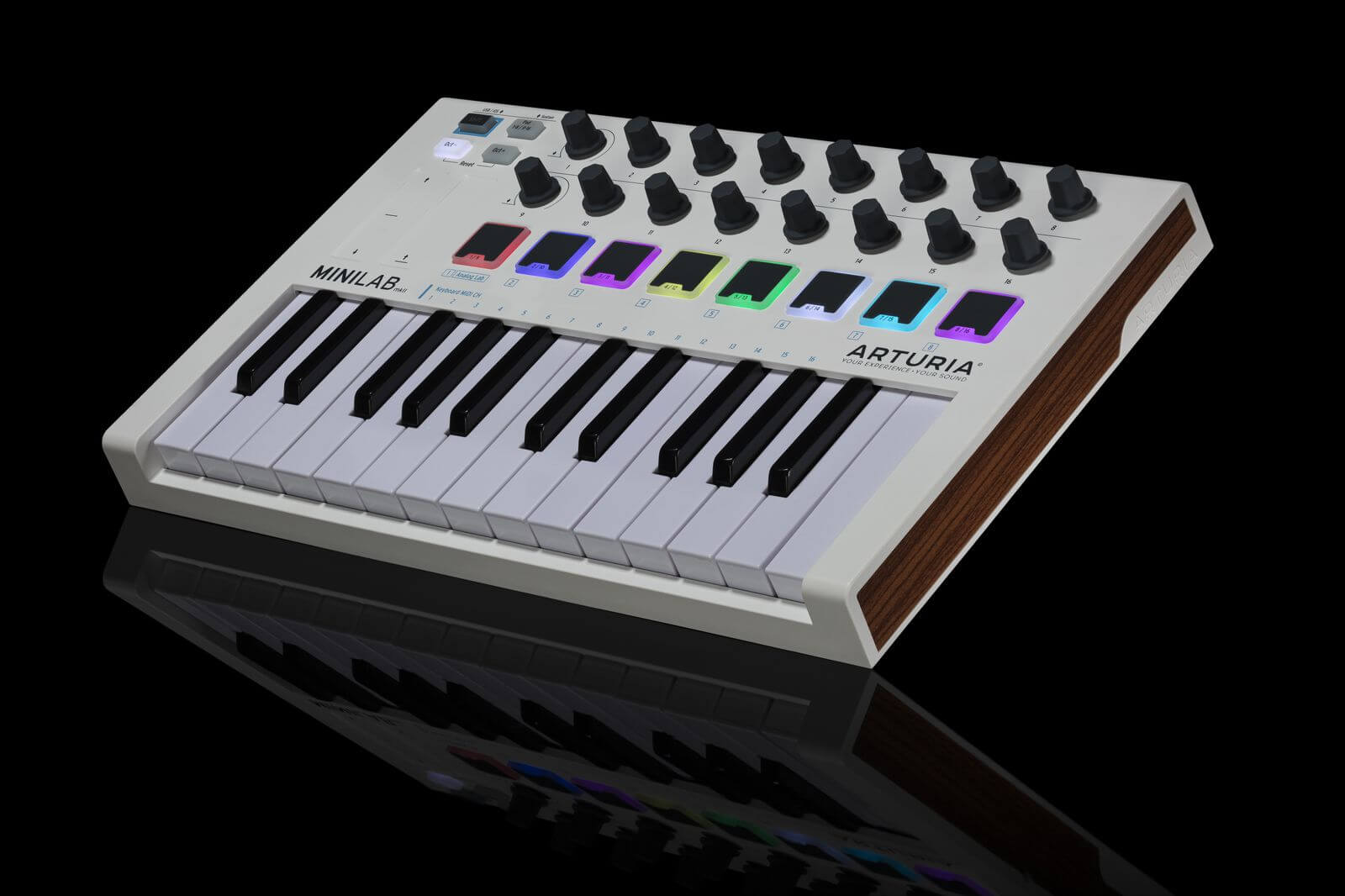
The 25 mini keys in the Arturia Minilab MK 2 have an equally strong build quality to the previous MIDI keyboards we’ve discussed. But compared to the previous MK 1, the new unit itself looks more modern due to the transition to piano-style mini-keys. However, the keys and controls haven’t changed at all.
The Minilab has pitch and mod touch strips rather than wheels (the sensitivity of which has seen a boost), as well as 16 rotary encoders and eight trigger pads. Controls for shifting octaves up/down and switching between two pad banks the pads between two banks are also present on the unit. Furthermore, a Shift modifier allows you to switch between eight MIDI maps via the pads and the first 16 keys can select different MIDI channels. The pads themselves are both pressure and velocity-sensitive, and you can edit the colours in the MIDI Control Center too.
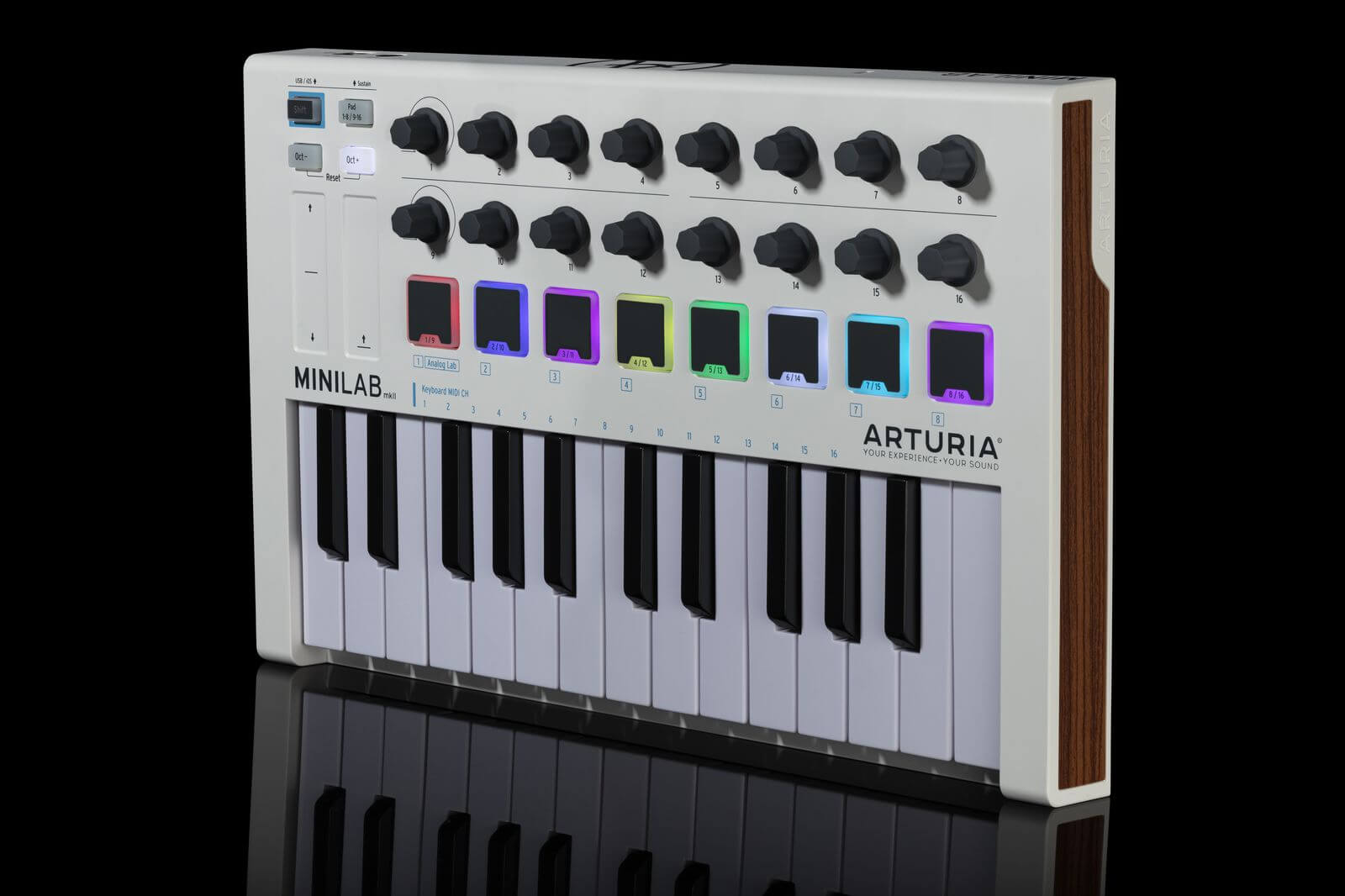
The 16 assignable encoders make DAW integration seamless because they make browsing and selecting presets quick and easy. Encoders one and nine double as push-buttons, but every knob is pre-mapped to the included software (Analog Lite). However, you can map the encoders and touch strips however you wish with your DAW’s MIDI Learn function. In fact, the plethora of controls on the Minilab means it’s unlikely you’ll find a plugin or virtual instrument with too many parameters for the MiniLab MkII to handle in real-time.
2. Novation Launchkey Mini MK3- best MIDI keyboard for beginners
- $99.99
- 25 velocity-sensitive keys
- 16 velocity-sensitive pads
- 8 encoder knobs
- Onboard arpeggiator
- Pitch and modulation touch strips
- Ableton Live control (including clip and scene launching)
- Fixed Chord mode for triggering chords from single notes
- MIDI Out enables connection to synths, drum machines and other MIDI hardware
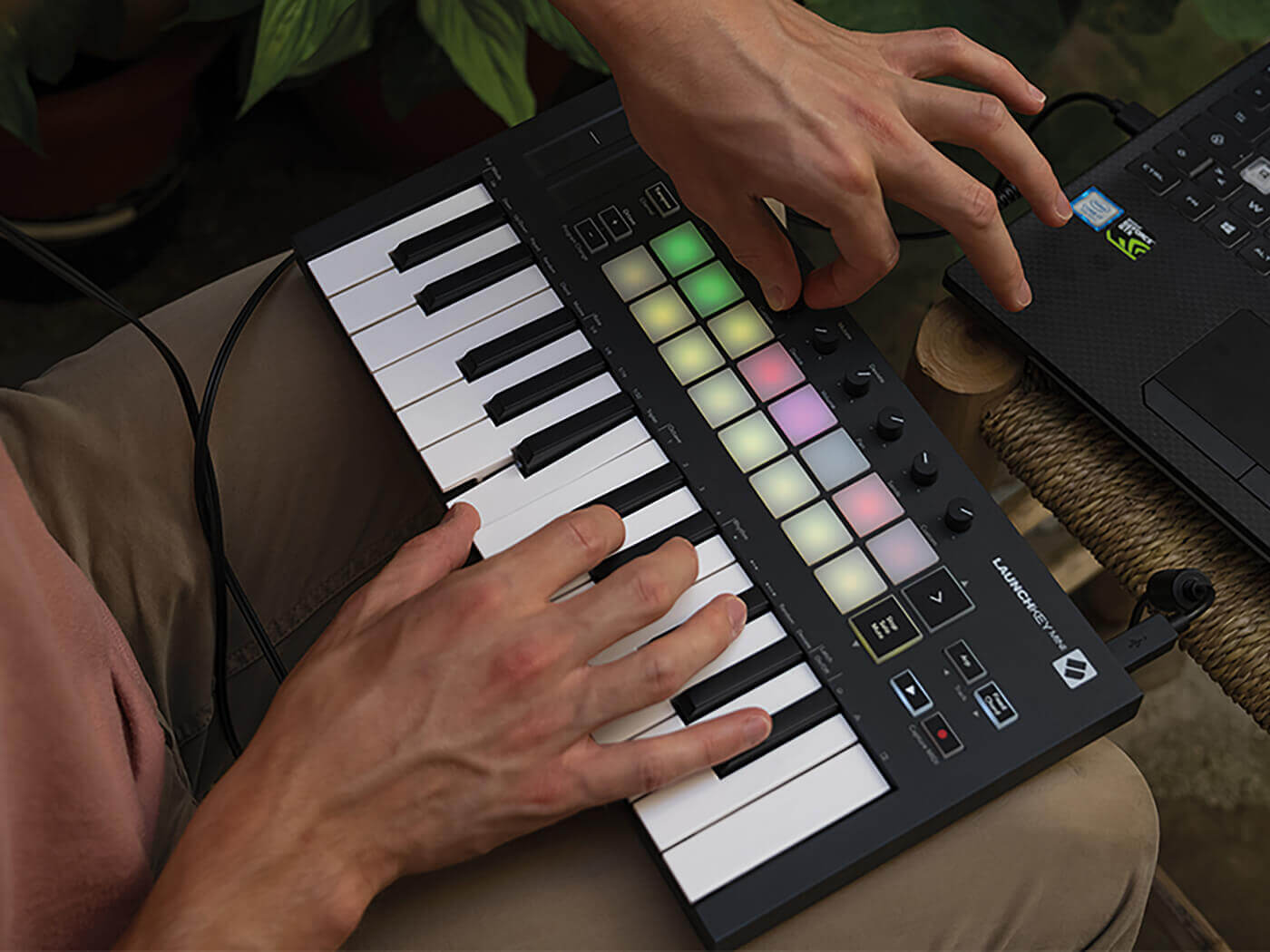
Next, we have the Novation LaunchKey Mini MK 3. Novation’s MIDI keyboard for beginners has had a serious upgrade.
The Novation Launchkey Mini presents a set of 25 mini keys keyboard and 16 velocity-sensitive pads into one neat controller. 8 assignable knobs also sit above the pads. The Launchkey Mini presents “plug-and-play” compatibility with Ableton Live, so it’s a one-stop-shop for budding musicians and producers alike. In addition to Ableton compatibility, you can integrate the controller with other DAWs such as Reason and Logic.
Map your pads to a virtual drum pad and jam a beat, map the keyboard to a virtual instrument and write a melody. And you can tweak the rotary controls at the top of the hardware to adjust instrument parameters! To the left of the pads, you’ll find two touch strips for controlling pitch and modulation too.
Moreover, its small size (no bigger than the width of a laptop) allows for easy transportation. As a result, this small and lightweight design is perfect for on-the-go music-making! With its rugged build, easy transportability, and nice layout feature, the Launchkey Mk3 is rugged and coupled with its easy feature layout too.
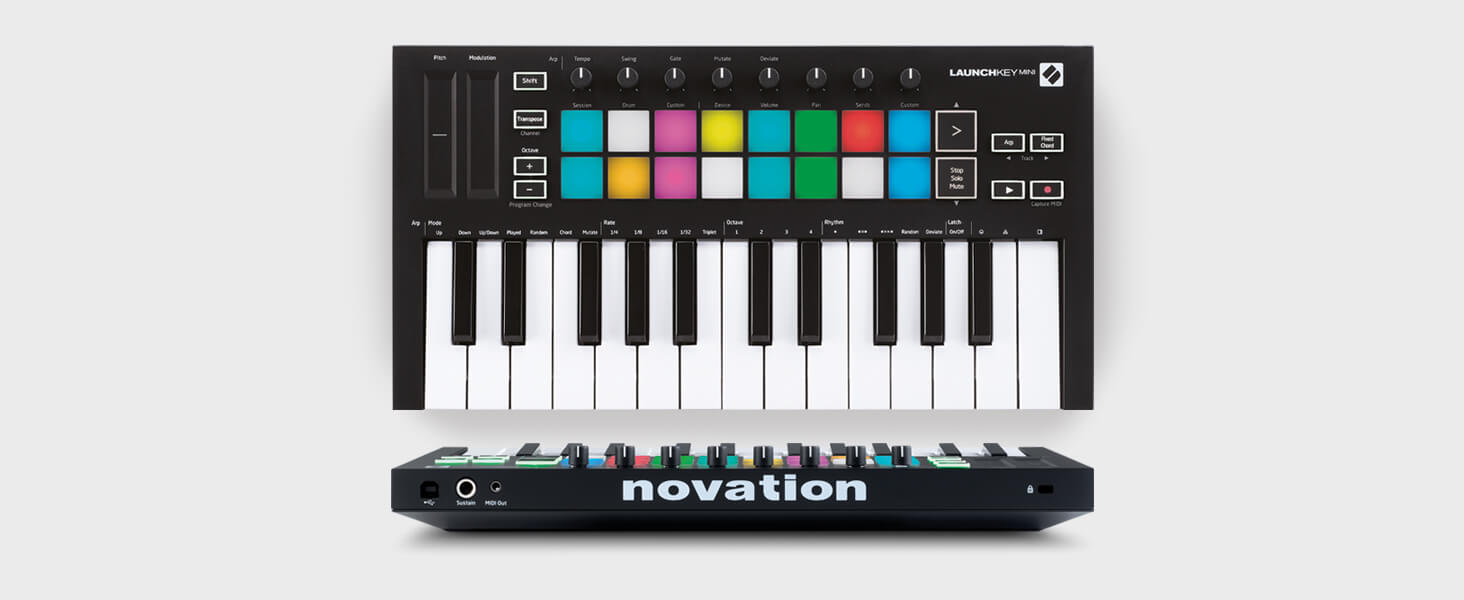
The onboard arpeggiator and fixed chord modes are two unique selling points of the Launchkey. The arp itself has a four-octave range, a range of modes and rhythmic patterns, not to mention timing divisions! As an example, you can auto-generate variations with Mutate mode and then trigger them up and down the keyboard using Fixed Chord mode.
Finally, you can control other hardware equipment with the MIDI output port. , too, enabling the Launchkey Mini to operate in standalone mode for use with hardware, with the arp and chord modes available. Unfortunately, this requires an adapter that is sold separately, and due to a change in format to adhere to new industry standards, existing Novation adapters for Launchpad Pro or Circuit synths will not be compatible.
1. Nektar SE25 – cheapest MIDI keyboard
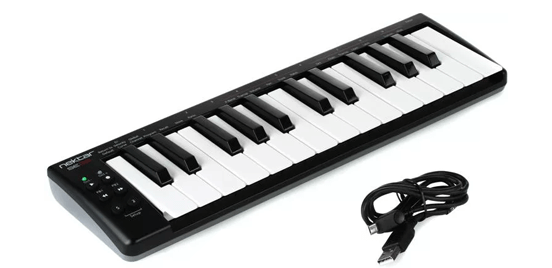
- $37.57
- 25 velocity-sensitive keys
- 3 velocity curves (default, soft, hard)
Finally, we have the most affordable MIDI keyboard controller. At just 400g, this lightweight 25 mini keys MIDI keyboard will fit in your bag for easy transport. Though the controller only has basic controls, they’re essential and functional. Freely assign controls to different parameters in your DAW via MIDI Learn, and, double up controls with other functions too.
If you were to use the controller as-is with no manual mapping then its top two buttons are Octave Up and Down. Beneath are PB1 and PB2 buttons which you can use to adjust pitch bend. Bear in mind though that you can assign one of six other functions to the P-Bend controls. These include transposition, volume, panning, track or patch. To make this parameter change you’ll need to enter Setup mode which you can do by pressing the two bottom buttons until the LEDs blink. You’ll then be presented with the different options that you can select with particular keys on the keyboard.
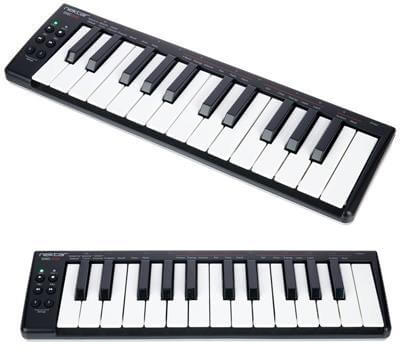
Further down the controller sits the S button. Simply put, you can use it as a Sustain or Modulation control. But the 2 button is a bit different. You can assign Octave, Channel, Transportation, Layer, or Latch by pressing the button once. Finally, press Play and Rewind together and the buttons will function as their assigned transport controls according to the graphics in them: play, record, rewind and fast-forward.
Included is a USB over MIDI cable for computer connectivity, and the port on the controller itself is a miro-USB. If you’re looking to include a sustain pedal in your setup, you may way to choose another MIDI keyboard on our list.
